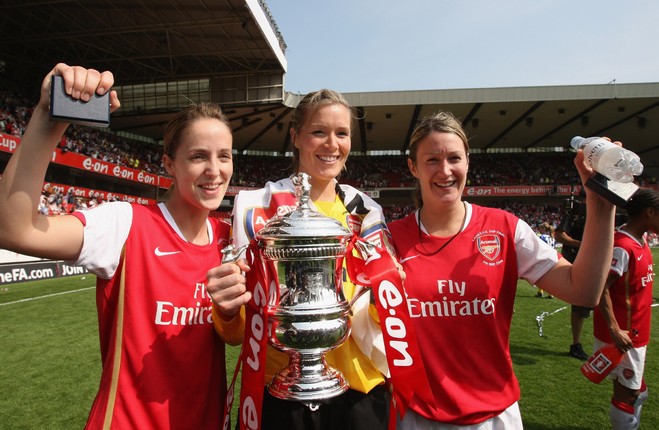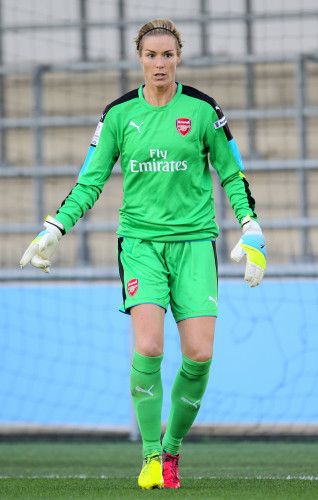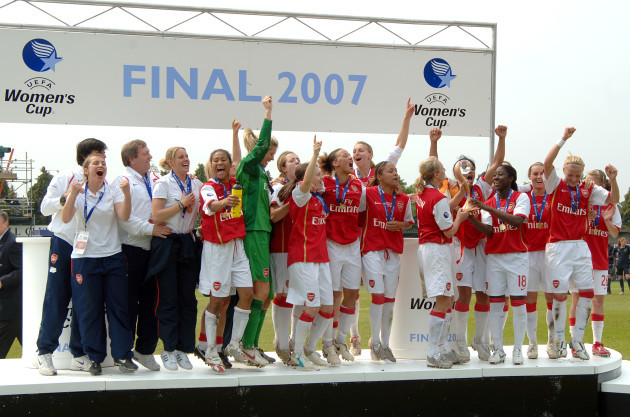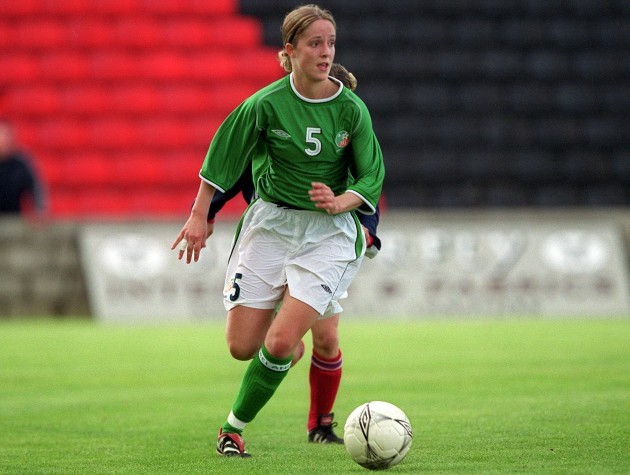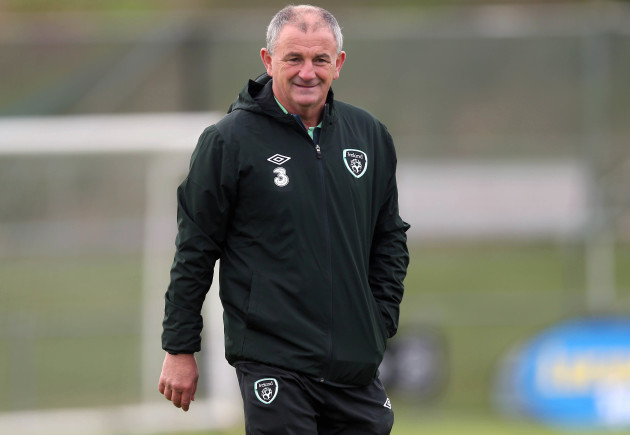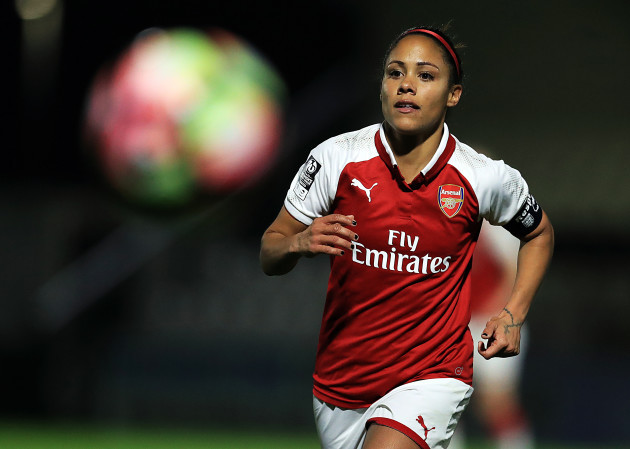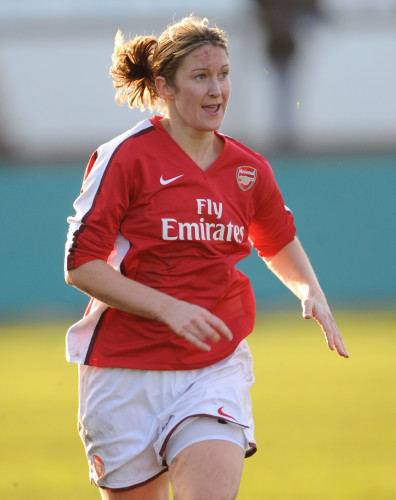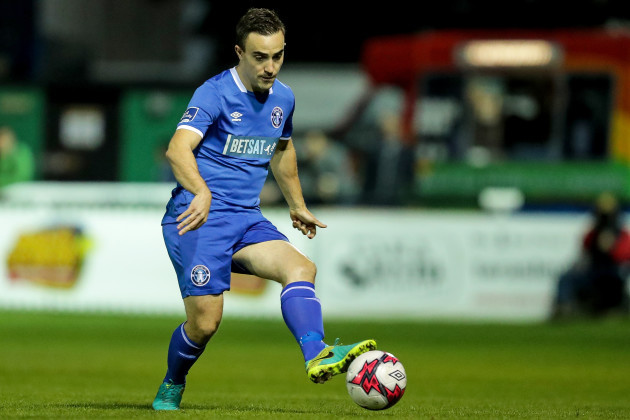WHEN PEP GUARDIOLA was asked about the prospect of winning an “unprecedented” domestic treble last May, the Man City boss corrected the reporter.
“Men’s. The first time in men’s [football].
“The women have won it.”
The Catalan coach was referring to Arsenal Women, who won a domestic treble for the first time in 1993 and did so again on three subsequent occasions.
And there were a number of Irish players who were integral to their success. Emma Byrne, Ciara Grant, Niamh Fahey and Yvonne Tracy all made significant contributions during the Gunners’ period of dominance.
And yet, these Irish sportswomen’s remarkable achievements have gone under the radar for the most part.
*******
Yvonne Tracy grew up in Limerick and spent her early years playing football mainly with boys.
“My friends at home were all boys basically,” she tells The42.
“I used to play with them as well up until the age of 12. Nobody ever said: ‘You’re wasting your time.’ Everyone knew how much I loved the game.”
She began her career at Clare-based side Lifford, winning a couple of All-Ireland titles along the way, while also spending time at local team St Patrick’s before moving to Arsenal in 2000.
“They tried their best with what they had, but there’s nothing like they’re getting now,” she says of her early years playing in Ireland.
We stayed in hostels. Every weekend, we went to Dublin for underage camps. But now it’s a total different ball game. They’re staying in four or five star hotels. They deserve it.”
Tracy was just 19 when she made the move to North London. She was playing for Ireland against Czech Republic and had been told Vic Akers, the then-Arsenal boss, was coming over to watch.
Two other Irish players who also made a positive impression on Akers, Susan Heapes and Caroline Thorpe, came over to England with Tracy. Byrne and Grant were already there at the time, as were Carol Conlon and Grainne Kierans, while Elaine O Connor would subsequently join.
Fulham were also interested in signing Tracy, but there was only going to be one decision made by the lifelong Arsenal fan.
The Irish contingent, meanwhile, all lived in a flat together that the club had housed them in.
“It was crazy,” she recalls. “We were playing training sessions and it was ‘the Paddies’ versus the English. There were Scottish and Welsh with us as well. It was the Celts versus the English in effect. We used to kill each other, there was murder every night in training.”
While Tracy found it relatively easy to settle into these new surroundings, four of the seven-strong Irish group would soon leave.
“They were getting a bit homesick and I don’t think they were getting their chance with the first team.”
The sacrifice, of course, is even greater than it is for Irish male aspiring footballers going over to Britain. While the latter group, for all the difficulties they endure, at least get substantial financial rewards if they make it in the game, the same could not be said for Tracy and co.
“I loved football. It was part of me growing up. So for me to train with a group of players, it was something else. There was no going back in the Irish league, because it wasn’t really that great at the time.
“We weren’t professional when we first came over. We trained Tuesday nights and Thursday nights from 8 to 10. There were people travelling from Brighton just getting their train fares paid and that was it, but not getting home until 2am. We just did it for the love of the game.
“We were out of pocket all the time when we went back to play with the Irish team, but it didn’t bother us. You’re representing your country, you can’t beat that.”
In addition, Tracy and her team-mates actually worked in the club’s laundry department in conjunction with their footballing commitments.
“It was a case of you’re working and looking to your idols every day. It wasn’t too bad. I still work there, but I don’t really do the laundry as much.
“I’m more in the kit side of it now and there are other girls that will do the laundry. So I’m just organising more than what I would do if I was doing the laundry.
“I work full-on with [the men’s team] every day. I’m on first-name terms, but it doesn’t faze me. Back in day, with Denis Bergkamp, Ian Wright and Thierry Henry, you’d be in awe of them.”
Tracy enjoyed almost instant success with Arsenal after joining in 2000, winning a domestic treble in her first season at the club.
To be fair though, at the time we were pissing the league,” she says. “There were about two or three good teams — that was about it. But it was getting more and more competitive all the time. Fulham went professional, but they weren’t in our league [initially]. Once they got promoted, that’s when the battles began.”
When asked how many major trophies she had won over the course of her Arsenal career, Tracy admits she had to consult Google to find out, before concluding it was “26 or 27″.
The unquestionable highlight was the quadruple year of the 2006-07 campaign, when they secured a domestic treble in addition the women’s equivalent of the Champions League. No English team had lifted the trophy before, nor have they done so since.
In the final, they faced two-time winners Umea of Sweden, whose team included Brazilian superstar Marta. An Alex Scott goal in stoppage time of the first leg proved the difference, as the Gunners ran out 1-0 winners on aggregate, with Byrne, in particular, excelling in goals.
“We had such a tight-knit group of players — the Welsh, Scottish and Irish captains were playing for us. It was just the team spirit that got us through. There was no way we should have won that at all. They were professional at the time. They should have absolutely battered us and they did to be fair in the final. I remember the shots on target, the possession and stuff like that, it was in their favour. But at the end of the day, we scored a goal and defended for our lives.”
Since then, just one Irish person, John O’Shea, has had a part to play in a Champions League triumph. And while the Waterford native is rightly acclaimed, the achievement of Tracy and co has tended to go unnoticed by most Irish sports fans.
“It’s a shame, because we didn’t get the coverage back then that the girls are getting now, so people don’t really know who we are and how successful we were. We won everything that there was to win.
At the time, you’d be lucky to get an FA Cup final shown [on TV] if they even showed that. But the two girls were phenomenal. Emma Byrne was the best goalkeeper in Europe for a long time. I was playing with her at club level and the Irish team. You knew you were in safe hands with her. A bit of a lunatic alright, as are all goalkeepers.
“Ciara was the exact same, a rock at the back. They were a very important part of the team the whole way through.”
It was a bittersweet period for Tracy, however. The Irish defender had missed much of the campaign through injury, and could not play a major part in the success as a result.
“I was just coming back. It was the semi-final I made the bench for. That was a tough season for me — I struggled with my knee for a long time. I had two different spurts. I was out for a year and a half [in 2006]. When I did it fully again [in 2008], I was out for another year and a half.
“If you do your cruciate nowadays, you’ve got a physio at hand who is in with you every single day. Obviously, the girls are professional now. Whereas I used to see a physio twice a week and be told: ‘Get on with it yourself.’”
As she battled to recover, Tracy strongly considered retirement on occasion.
“I was coming back and started joining in the training sessions. I wanted to do things, but my body and knee weren’t letting me do it.
“It was just so frustrating. I just broke down one day in training and said: ‘I’ve had enough.’
“The physio at the time stuck by me and kind of pulled me through it a bit.
But there was a time when I thought: ‘There’s no way.’ My knee has never been the same since I had the operation done.
“After I had that done, I know myself I struggled. It’s just one of them things.
“It was just a case of playing the first match back and getting minutes under your belt and actually playing in a game situation. I think we played a pre-season game. I got my first half hour and once I came through that, and I had a few crunching tackles, I knew I’d be alright.”
In addition to her Arsenal achievements, Tracy won 78 caps for the Irish team. And the 38-year-old says she would have swapped all her medals with the Gunners for a chance to compete in a major tournament at international level. The Girls in Green came closest to doing so when they reached a Euro 2009 play-off against Iceland. Having drawn the first leg 1-1 at Richmond Park, they were defeated 3-0 in the second leg.
“The pitch was frozen solid,” she remembers. “The head groundsman at Arsenal was the groundsman out there and he was like, ‘there’s no way this game should be played’. He was hitting the ice with a shovel and it sounded like he was hitting concrete. One of the girls fell, it was so hard. She had to go to hospital that night, because she thought she’d broken her hand from falling. Iceland were used to it. They knew what studs they were wearing. If you wanted to stop [when running], you had to stop about five yards behind where you actually wanted to stop.
“It was devastating for us, because it’s the closest we’ve ever got to a major tournament.
“I miss playing with the Irish team way more than Arsenal. It was two totally different environments.
At Arsenal, every game, you knew you were going to win. Whereas with the Irish team, you didn’t. You knew you had to fight to even stay in the game. When we won everything at Arsenal, we never took anything for granted. We knew how bad it was to be on the opposition side, getting beat all the time, because we struggled on the Irish team.
“In every other country, they all had semi-pro players. Some of them even had professionals. So they were much fitter than us.
“The girls [in Ireland] are playing every Saturday and the games are like 10-0 to one side. You’re lacking a good game. They were training once or twice a week per season. And yet you’ve other countries that are training four or five days a week and are on strength and conditioning programmes.
“When we played under Noel King, teams were only beating us 1-0 or 2-0, because we were so well set up. We defended for our lives. The heart and spirit was just ridiculous. Other teams couldn’t match us for that. But we’d end up losing the game in the last 15 or 20 minutes, because we were too tired. We couldn’t keep up with them physically. If we had had the support back then, we could have done big things.”
Increasingly, however, Tracy was in an environment that starkly resembled a professional set-up. Having started out with two nights of training a week, Arsenal switched to three and then four towards the end of her career.
But there were still some caveats during her time with the Gunners that made it clear the men’s team took extreme priority over the women’s side.
“We were only allowed train in the nighttime. But now the girls are nearly on a par with the men. They have their own training facility, changing rooms and everything. We’d have to wait. We weren’t allowed train on the grass. We were indoors on astroturf all the time, which wasn’t very good on the body. The girls now are training at whatever time they want. They’re using the gym, they’ve got access to absolutely everything, what the men do, they’re living their best lives. I’d like to think we paved the way for them.
“Someone said to Alex Scott that we were very successful because we had no opposition playing against us basically. And Alex said: ‘Yeah, but we didn’t have the facilities and the support that you lot have now.’”
Moreover, the club’s England internationals tended to get preferential treatment to the rest.
They were professional. So they could only do a certain amount of work a week. If they were even allowed to do 20 hours a week, that was too much for them. So they were getting a salary from England alone — this was about 10 years ago — about £20,000, plus their Arsenal contract. They’d have morning sessions where they were doing strength and conditioning twice a week. And then doing an extra fitness day.
“We only started doing that towards the end, so [the England internationals] were always that step ahead of us fitness-wise. They were leaving us for dust in training.
“I wouldn’t say there was friction as such. We were happy they were getting what they were getting. It was just frustrating for some of us in training.”
She continues: “I’ll never forget the first time me and Ciara Grant did a strength and conditioning session. The two of us couldn’t walk for a week afterwards. We’re not used to doing things like that. I was about 30 at the time. Ciara was obviously 33 or 34.
“They were trying to make us do it and we were just like: ‘This ain’t for us. We’ve got no chance.’
“It was just ridiculous. We could barely train after it. We just didn’t bother doing it [again], because we couldn’t. We were on the least amount of weights and everything, but we were struggling. We’d do our own gym sessions obviously, but they had us doing Olympic discus and stuff like that. You’re just looking at it going: ‘Nah, we’re too old. Why would I put myself through torture like that?’”
In 2005, Tracy’s brother Shane came over and played with the Gunners at underage level. After two and a half years, however, he departed, having failed to make a first-team breakthrough. He went on to enjoy a sustained career in the League of Ireland though, and had his testimonial at Limerick in 2017.
“The first season, he wasn’t allowed play with the 18s. He was too young and he was only a scholar. The next year, he played 18s, but he was playing reserve football then every week.
“Then he came to his third year and he wasn’t even playing with the 18s. It’s like: ‘What am I doing? Why am I here?’ I knew myself he was done. He’s one of those young fellas that once he has his mind made up, he’s as stubborn as a mule.
I used to come up off the bus and watch the games that he’d play off the training ground. He’d ring me, I’d pick him up off the bus and he’d just be devastated about the fact that he was not playing [on matchday]. For him, it was the final nail. He was just like: ‘I’m going home.’”
Tracy finished up herself in 2014 at the relatively young age of 32. The cruciate injuries had taken a toll on her body, and she was no longer guaranteed a starting spot for club or country.
“My knee, there wasn’t a day I wasn’t in pain all the time. I got to the stage where I wasn’t playing as often as I would like and I was getting pressure from Sue Ronan in the Irish team, saying I needed to play to be in the Irish team. In the end, I just thought: ‘I don’t need this anymore.’ I couldn’t keep working in the club and go play for another club. So if I wanted to play for another club, I basically had to leave [my job].
“I’d play in the staff game and thought: ‘Sure I can’t walk for about two days after it. So for me, it’s not worth it anymore.’
“I was still doing my daily things, so it wasn’t a big change for me. I wasn’t training every evening, so I would get to work at nine o’clock in the morning, and [before] I wasn’t leaving there until nine or 10 o’clock at night.
“But other than that, it wasn’t much of a transition, because I’m still in the same environment. Whereas if I’d left completely and went to work in a factory or something, I think I would have struggled.”
So on the one hand, Tracy feels lucky to have enjoyed the illustrious career she did, though part of her admits to feeling somewhat envious on account of the opportunities afforded to female players today.
“When I first came over, you’d get away with going out on a Friday night, but that soon changed after a year or two and you knew you had to mind yourself. You had to be careful even in terms of what you eat and stuff like that. When I was playing, I hadn’t a clue, and when it came towards the end of playing, I was thinking: ‘I haven’t even been to college, I’ve done nothing.’
So I did personal training and I’ve also done strength and conditioning. I actually wish I had something like that done when I played. It makes you realise how important things like that are and it makes you look after yourself that extra bit. So I would recommend if you are studying and doing football at the same time, to think about doing something in the fitness or even the nutrition side that you can do that will help you progress in the game.
“That’s the way it’s going. If you look at the Americans, who are after winning the World Cup, technically, they’re not great — it’s all physicality with them. They’re all very strong and that’s the way forward, that’s what wins you trophies.
“[At international level] it was tough. You had people paying mortgages and you had to compensate them. It was coming out of their holidays. People were taking unpaid leave from work to go and play for the national team.
“I met a good group of people along the way, so I don’t think I would have changed [my career]. It would have been nice obviously to be professional. Noel King went with the Irish team to Indiana and trained full-time for two months, so we got a taste of it and it was just the best two months ever. We trained two times a day. But unfortunately, I was born 10 or 15 years too soon.”
The42 is on Instagram! Tap the button below on your phone to follow us!
